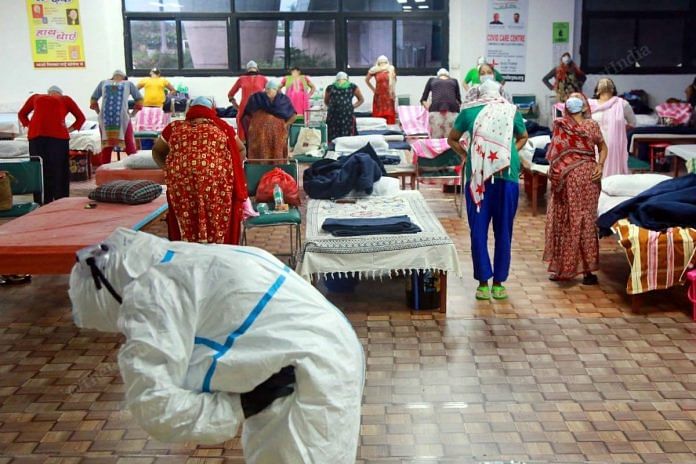New Delhi: The Ministry of Health and Family Welfare (MoHFW) Sunday released guidelines for post-Covid care of patients who have recovered from the disease. The guidelines include taking AYUSH medicines based on prescription and practising Yoga to boost immunity.
The guidelines are for those recovered patients who continue to report symptoms such as fatigue, body ache, cough, sore throat and difficulty in breathing.
The government’s guidelines came on a day Union Home Minister Amit Shah was admitted to AIIMS in New Delhi for a second time for “post-Covid care” after he reportedly felt uneasy.
As of 13 September, India has a total of 4,754, 356 coronavirus cases, with 78,614 deaths and 3,702,595 recoveries.
Also read: Yellow, Blue, Magenta, Red — Delhi’s metro lines are now running like it’s business as usual
AYUSH medicines, Yoga, ‘Covid-appropriate behaviour’
The guidelines state that recovered patients should continue to practise “Covid-appropriate behaviour” at the individual level that includes wearing a mask, hand hygiene and following social distancing norms.
“Adequate amount of warm water”, if not indicated otherwise by doctor, and immunity boosting AYUSH medicines, only on the advice of a qualified practitioner, have been suggested too.
The guidelines also recommend one spoon of chawanprash in the morning with water or milk on the recommendation of the AYUSH ministry.
The guidelines also recommended mild or moderate exercise in the form of Yoga and walks. The ministry said regular household work can be done “if health permits”, while professional work can be resumed “in graded manner”.
Medicines to alleviate Covid-19 symptoms should also be continued, along with those for comorbidities, if any. Patients have been asked to monitor their oxygen levels, temperature, blood pressure and, in case of diabetic patients, blood sugar too.
For persistent cough, the guidelines recommended gargling with saline water and steam inhalation using herbs. Patients have been asked to look for signs of high grade fever, breathlessness, weakness or new onset of confusion.
Follow-up visits at healthcare facilities
The health ministry’s guidelines recommend a consultation with a doctor, either though a physical visit or online, within seven days of discharge from a hospital. Subsequent follow-up treatment can be done by any physician or AYUSH practitioner.
However, polytherapy (combination of different therapies) is not recommended due to its potential for drug-to-drug interaction that may lead to complications and severe adverse or adverse effects. Those who report severe post Covid-19 symptoms have been advised to visit a healthcare facility.
Community participation
The government’s guidelines also recommend community participation to tide over social stigma associated with the illness. The guidelines state that recovered patients should interact with self-help groups, share positive experiences to dispel myths and rumours, and participate in group activities such as Yoga and meditation.
Recovered patients have also been advised to seek help for mental health support and recovery as well as rehabilitation.
Also read: Oxford and Covaxin to Sputnik V — the many Covid vaccines in trial & how they’re faring




For some unlucky patients, many viral infections leave their impacts on the nervous system and the brain even after the virus is evicted by the body or contained by the immune system. For some brain fog is lifelong. There are permanent alterations in brain – immune system signalling.
Further research in post-Covid fatigue and brain fog is warranted so as to understand
better the close coordination between the brain and immune system.
Sadly doctors in India are not too aware of this. They misdiagnose it as a tension headache or nutritional issue.